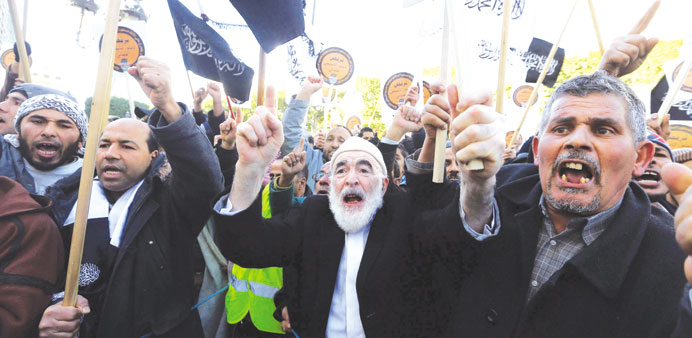Supporters of the Islamist Hizb Ut-Tahrir party shout slogans during a protest against the new constitution in Tunis yesterday.
AFP/Tunis
Tunisian lawmakers are to vote today on adopting a long-delayed new constitution, seen as crucial to getting the democratic transition back on track more than three years after the revolution.
“The vote will be held tomorrow, Saturday,” Mofdi Mssedi, spokesman for the speaker’s office, said yesterday, a day after parliament completed its review of each article in the draft constitution.
The time of the vote has yet to be determined, but the charter needs the approval of two-thirds of the 217 assembly members to be adopted.
That would pave the way for the appointment of a caretaker cabinet of independents headed by premier designate Mehdi Jomaa, after the ruling Islamist party Ennahda agreed to hand power to a technocrat administration, under a deal to end months of political deadlock.
Jomaa’s government will be tasked with leading the country to parliamentary and presidential elections, scheduled to take place later this year.
“A plenary session will take place on Tuesday or Wednesday for a vote of confidence in this new government,” parliament speaker Mustapha Ben Jaafar told Tunisian radio.
Lawmakers completed their line-by-line scrutiny of the text late on Thursday after three weeks of heated debate and disagreement on a range of subjects, including the role of Islam, women’s rights, the independence of the judiciary and the president’s powers .
Ennahda’s veteran leader Rachid Ghannouchi hailed the draft charter as a “historic achievement” which he said would enable the establishment of the first democracy in the Arab world.
“We are at an advanced stage of the (democratic) transition, all that remains is to officially adopt this historic document and fix the date of the next elections,” Ghannouchi said in a statement.
“We should be proud of what has been achieved, and translate that into ending the interim period and making Tunisia the first Arab democracy.”
Under the new constitution, executive power is divided between the prime minister, who will have the dominant role, and the president, who retains important prerogatives notably in defence and foreign affairs.
Islam is not mentioned as a source of legislation, although it is recognised as the nation’s religion and the state is committed to “prohibiting any attacks on the sacred”, while freedom of conscience is guaranteed.
Human rights are broadly enshrined in the text, although some rights groups have expressed concern that the relevant provisions are often vague.
And the charter also upholds gender equality and the rights of women “without discrimination”, and commits the state to promoting equal representation in elected bodies, something unprecedented in the Arab world.

